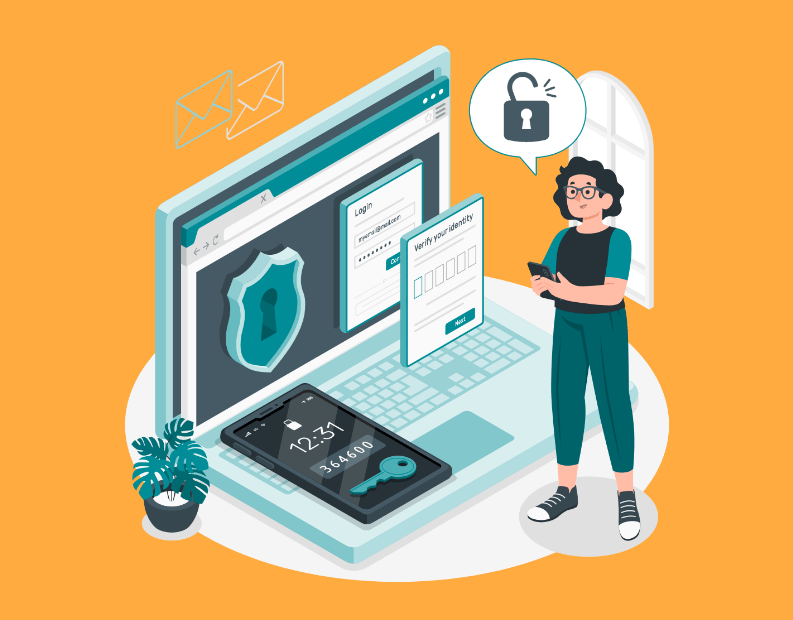Our job at Unbound is to help businesses succeed using online marketing. Some companies we work with are 100% online, while others use online to promote their business.
Unfortunately, Cybercriminals are always looking for ways to exploit weaknesses in online systems and steal sensitive information. As a business owner, taking proactive steps to protect your business and customers’ data is essential. Here are some tips on how to secure your business online.
Add A Privacy Policy To Your Site
Having a privacy policy is crucial for protecting your customers’ data. It is vital to take the time to craft an approach that is clear, concise, and comprehensive. In addition to explaining what information you collect, how you use it, and whom you share it with, you should also consider outlining the steps you take to protect your customers’ data from unauthorized access or disclosure. The privacy policy may include encryption, access controls, and regular security audits.
Your privacy policy should also be easily accessible to your customers. Consider placing a link to your policy in a prominent location on your website or including it as a separate document in any communications you send to your customers. Finally, it’s essential to keep your policy up-to-date. As your business evolves and your data collection practices change, update your policy to ensure it accurately reflects your data privacy practices. Several online resources help you create a privacy policy for your website, such as privacy.org.nz.
Solid Password Security
Using strong passwords is essential for preventing cyber attacks. A strong password should contain upper and lower-case letters, numbers, and symbols. One way to generate a strong password is to use a passphrase, such as a sentence with multiple words. For example, “My dog’s name is fluffy, and he likes to play fetch!” can be turned into a password by using the first letter of each word and adding numbers and symbols, resulting in “Mdnif&hltPf!”.
Another important aspect of password security is avoiding common passwords, such as “123456” or “password”. These passwords are easily guessable and leave your accounts vulnerable to attack. A password manager can help you avoid common passwords by generating unique passwords for each account. It can also store your passwords securely, so you don’t have to remember them all.
Consider using a password manager to generate and store your passwords securely. A password manager (such as Dashlane -the one we use at Unbound) can help you create robust, unique passwords for all your accounts, making it much harder for cybercriminals to access your personal information.
Keep Your Website Security Tight
Securing your website with SSL (Secure Sockets Layer) encryption is crucial for protecting sensitive information, such as credit card numbers and login credentials. SSL encryption ensures that data exchanged between the website and the user is secure and cannot be intercepted by malicious third parties. Having SSL encryption is especially important if your website collects and stores user data.
In addition to SSL encryption, keeping your website’s software up to date is vital to prevent vulnerabilities from being exploited. Regularly updating your website’s software can help prevent hackers from exploiting known vulnerabilities to gain unauthorized access or steal sensitive information. It is essential to make sure any plugins or third-party software used on your website are updated.
Another critical aspect of website security is implementing strong password policies. Encourage users to create strong passwords and require them to change their passwords to protect their accounts periodically.
Finally, consider implementing additional security measures such as two-factor authentication or IP blocking to enhance your website’s security posture. These measures help prevent unauthorized access to your website and provide extra security for sensitive information.
Secure Your Devices
It is crucial to secure all the devices your employees use; this includes laptops, smartphones, tablets, and other devices used to access company information.
One effective way to secure these devices is by requiring solid and unique passwords or implementing biometric authentication. Doing so can significantly reduce the risk of unauthorized access to your company’s data. It is also essential to encrypt any sensitive data stored on these devices. Securing sensitive data will make it much more difficult for hackers and other malicious actors to access this information, even if they can access the device itself.
Finally, it is also essential to implement remote wipe capabilities on all devices used in your business. The ability to wipe remotely will allow you to erase sensitive data stored on a lost or stolen device, ensuring that your company’s information remains secure even during a security breach. Overall, taking these steps to secure your devices is essential for protecting your business and maintaining the trust of your customers and clients.
Secure Your Channels
An essential step in protecting your business’s social media and email accounts is to use two-factor authentication (2FA). 2FA adds an extra layer of security to your accounts by requiring an additional step for verification, such as a code sent to your mobile or a biometric scan. 2FA can help prevent unauthorized access to your accounts, which is especially important if you handle sensitive information or have a large following. In addition to using 2FA on platforms like Facebook and Google (We see many people who do not have 2FA active on their Google Ads or Facebook Ads accounts), it’s also a good idea to regularly review your security settings and update your passwords to enhance your security measures further. Remember to educate your employees on the importance of strong passwords and proper security protocols to secure your business’s online presence.
Keep Your Devices Up to Date
Keeping your devices updated is important to ensure your business is secure. Regularly updating your software and apps can prevent vulnerabilities and protect against potential security breaches.
In addition to setting up automatic updates on all of your devices, there are other steps you can take to ensure your devices stay up to date. For example, you can regularly check for updates manually and make sure you have installed any updates promptly.
It’s also important to remember that updates don’t just address security issues. They can also improve performance and fix bugs, making your devices run more smoothly and efficiently. By keeping your devices up to date, you can ensure your business operates at its best.
Importance of Backups
Regularly backing up your data is crucial for protecting against data loss. Backups are critical today when cyber attacks are becoming increasingly common. Hackers can infiltrate your computer or network, steal your data, or even hold it for ransom. Hardware failure is another common reason for data loss. Hard drives can fail without warning, and you could lose all your important files if you don’t have a backup.
A cloud-based backup service helps to ensure your data is safe and secure. This service allows you to store your data remotely, so even if your computer or network is compromised, your data is still safe. Some cloud-based backup services even offer the ability to restore previous versions of your files, giving you an added layer of protection.
In addition to cloud-based backup services, having multiple data backups is also a good idea. These backups could include an external hard drive or USB drive that you keep in a safe place or even a physical copy of important documents. By having multiple backups, you can ensure that even if one backup fails, you still have other options for recovering your data.
Overall, taking the time to back up your data regularly is an essential step in protecting against data loss. Don’t wait until it’s too late – start backing up your data today!
Use VPNs on Public Wifi
When accessing your business’s data or systems on public wifi, it is vital to ensure that you protect your data from potential security breaches. One effective method of doing so is by using a virtual private network (VPN). VPNs work by encrypting your data and routing it through a secure server, making it much more difficult for hackers to intercept and access your data. In addition to providing an added layer of security, VPNs can also help to ensure that your internet activity remains private and anonymous. By masking your IP address and location, VPNs can help to prevent tracking and profiling by advertisers and other third-party entities. So, you frequently use public wifi to access sensitive business information. In that case, you should start using a VPN to ensure the security and privacy of your data.
Educate Your Employees
Educating your employees on cyber security is crucial to protecting your business from online threats. Consider holding regular training sessions to teach your team about the latest cybersecurity trends and how to stay safe online. It’s crucial to cover the basics of identifying phishing scams, creating strong passwords, and educating your staff on handling sensitive information and responding to a security breach. Please encourage them to immediately report any suspicious activity or potential security threats to IT. Additionally, consider implementing a security awareness program to keep your employees informed and engaged in cybersecurity best practices. By taking these extra steps to educate and engage your team, you can significantly reduce the risk of a cyber attack on your business.
Cyber Insurance and More
In today’s digital age, cyber threats are a significant concern for businesses of all sizes. It is vital to consider investing in cyber insurance to protect your business and your customers’ data. This type of insurance can help cover data recovery costs, legal fees, and more in the event of a cyber attack.
In addition to cyber insurance, there are other steps you can take to enhance your business’s security. For example, regularly reviewing and updating your security measures is crucial to stay ahead of the latest threats. These security measures can include implementing multi-factor authentication, keeping software up to date, and training employees on best practices for cyber security.
Another critical step to developing an incident response plan is to outline your business’s actions during a cyber attack, including who will be responsible for what tasks and how communication should be handled. It’s essential to regularly test and update this plan to ensure it is effective.
By taking these steps, you can help protect your business from cyber threats and give your customers peace of mind that their data is safe with you. Cyber security is an ongoing process, and staying vigilant and prepared to face any potential threats is essential.






